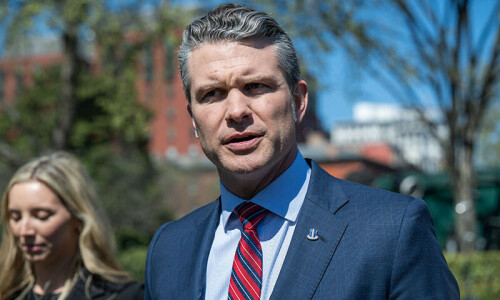WHILE Pakistan is struggling to achieve stabilisation and revive growth, the Syrian crisis can shift its goal post farther.
Rising oil prices as a result of the crisis can impede stabilisation efforts, and the current investor confidence may become difficult to sustain.
“Markets are jittery and investors are nervous the world over at the prospect of a looming conflict in the Middle East, as the West flexes its muscles to punish President Assad, who is suspected to have used chemical weapons. I don't see why it would be any different in Pakistan,” James Arthur, a staff member at an investor advisory firm told Dawn in reply to a question on the fallout of the Middle East crisis.
The Nawaz Sharif government has budgeted oil at the rate of $110 per barrel. At this rate, the oil import bill has been projected at $16 billion for 2013-14. Last Thursday, oil was already trading at $117 per barrel in the international market, and is expected to hit $125 in case of heating up of the situation in the Middle East.
With oil at $125 billion a barrel, the import bill will escalate by around Rs800 billion or $780 million for the year. Where will the additional money to cover for this hike in the import bill come from?
At a nine per cent tax-to-GDP ratio, it is hard to imagine a cash-strapped government successfully managing the deficit through spending cuts.
Despite the goodwill the Nawaz Sharif government enjoys in the business fraternity, the growing uncertainty will weigh heavily on business sentiments. A spike in private investment to perk up growth thus assumes a question mark.
Low GDP growth, rising inflation, widening fiscal deficits, and weaker currency will all add up to the country’s economic difficulties.
Also, a possible domestic public backlash to the West’s Syria policy may further aggravate the fragile security situation in Pakistan by widening the fissures in an already divided society, and have its own impact on the economy.
“Pakistan needs to prepare to minimise the fallout of the impending conflict in Syria, which has the potential to blow up, enveloping the entire region,” said an analyst monitoring Pakistan.
“Isn’t your economy already in tatters? To me, the future depends more on the IMF agreement, and less on whatever goes on around the world,” commented Nancy, another young professional who operates from a flat in Manhattan.
However, some other experts in New York and Washington are not ready to give up their optimistic outlook for Pakistan, which they believe crossed a milestone when it completed the democratic transition despite all odds three months back. They believe the country has done what was asked of it to qualify for the IMF bailout package.
They are also all praise for the current government, which, they argue, has displayed courage to take some politically difficult but necessary decisions to improve the country’s economic management. These specialists mention the power rate revision, start of the reform process in public sector enterprises, rationalisation of taxation policy, reactivation of the privatisation programme, and the plan to revise domestic gas rates upwards in this regard.
The IMF package, which they expect would be announced after the IMF board meeting on September 4, would open up other avenues of dollar inflows. This could ease balance of payment pressures and create fiscal space to tackle physical and social infrastructure deficits.
The concerned officials of the US State Department and the Pakistani diplomatic mission discussed possible economic impact of explosive Middle East situation on Pakistan, but declined the request to speak on record.
Dr Pervez Hasan, a senior economist based in the US, who has written extensively on issues confronting Pakistan and is currently engaged in a project on the study of the energy sector, dismissed the suggestion that the evolving situation in the Middle East would divert the attention of the sole super power from South Asia.
“Pakistan can possibly not be wished away. It will get the attention and support it requires from the West. The nuclear assets, besides the size and strategic location, determine US attitude towards the country, argued Dr Hasan.
The writer is on a visit to the USA.

















































